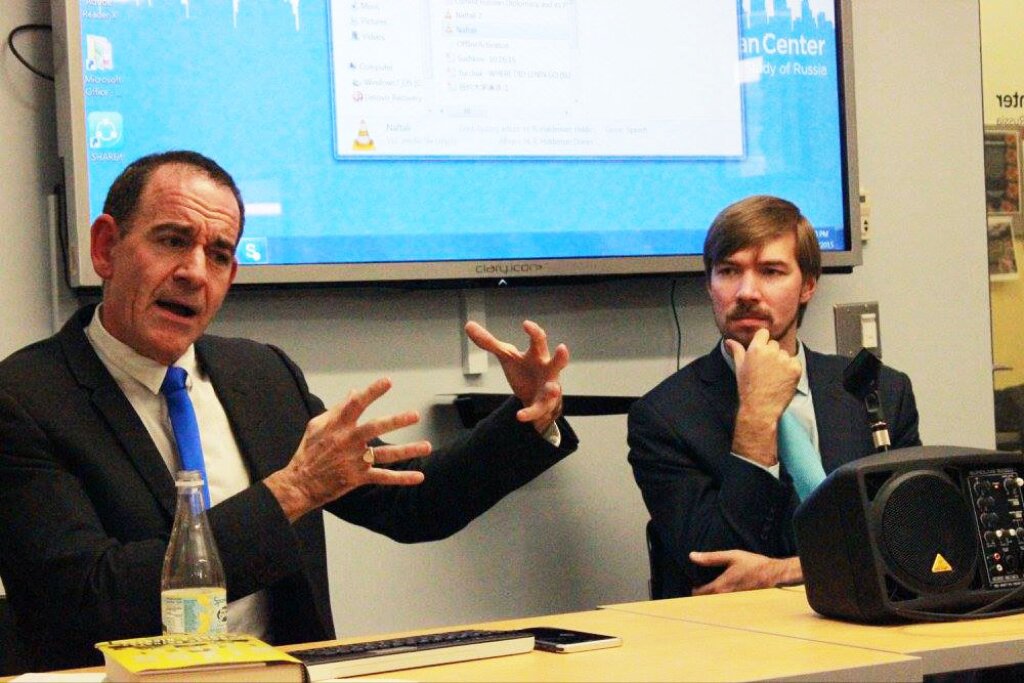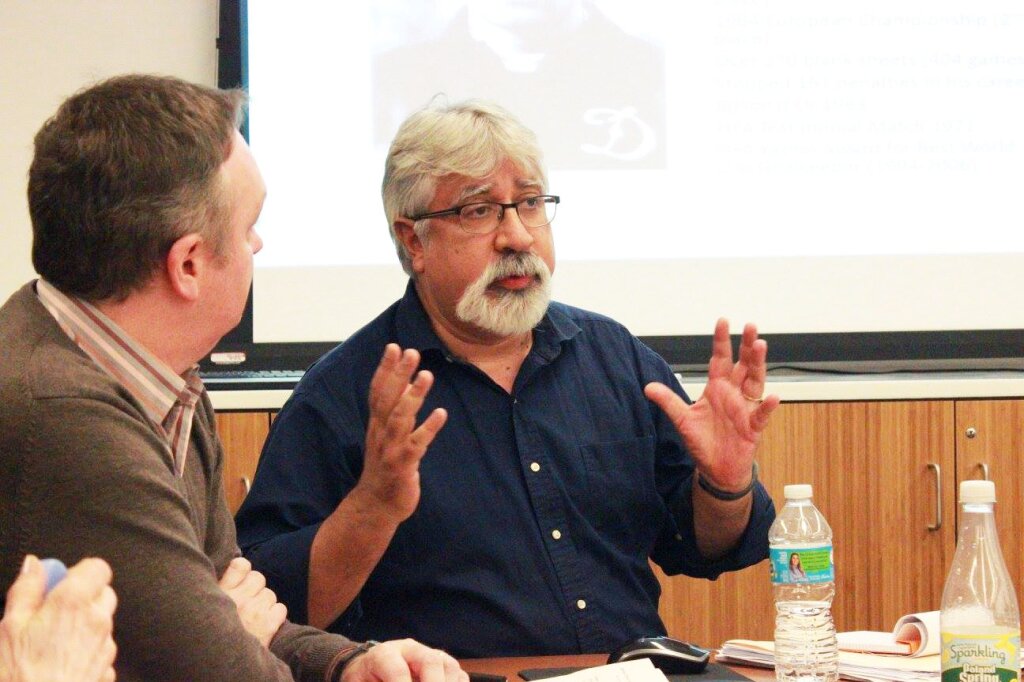Watch the video of the event here
On October 21, 2015, the NYU Jordan Center for the Advanced Study of Russia welcomed a panel of distinguished speakers for a discussion titled “The Great Triangular Game: Russia, China, and the USA, Past and Present.” The event, devoted to mutual relations between Russia, China and the United States, featured Li Xing, Director of the Center for Eurasian Studies, Professor of International Relations at Beijing Normal University; Dmitry Savkin, Director for Internationalization and Associate Professor at the School of Public Policy at RANEPA; and Tim Naftali, Associate Clinical Professor of History and Public Service at NYU and Co-Director of NYU’s Center for the United States and the Cold War. The panel was moderated by Jordan Center Director Yanni Kotsonis.
The discussion began with a presentation by Xing, who focused on the triangular relationship between China, Russia and the U.S. in contemporary foreign politics. For Xing, two aspects express this triangularity. “First, the triangle is a sort of model for interaction among three actors in international relations. Second, within the framework of the triangle, changes in bilateral relations between any two of these actors can to varying degrees have an effect on the bilateral relations among the other actors that are part of the triangle.” Xing drew attention to Chinese initiatives of regional management and the Russian and American attitudes towards them, from the “one belt, one road” strategy (a development plan for Eurasia, also known as the “silk road” initiative) to the creation of the Asian Infrastructure Investment Bank. Russia, he noted, intends to integrate the “silk road” initiative in its project of economic integration in Eurasia and is already a member of the Asian Infrastructure Investment Bank. Meanwhile, the United States “has been indifferent to the ‘one belt, one road’ strategy” and other Chinese initiatives, including formal cooperation between the Transpacific Partnership and the “silk road” group. Xing also noted that China and the United States hold diverging attitudes towards Russia; in particular, China did not join Western countries in imposing sanctions on Russia in the aftermath of the Ukrainian crisis.
Finally, Xing discussed the three countries in terms of economic models and their transformations in the post-Soviet era. While the United States, a developed country, has endured a slow transformation, both Russia and China have endured radical changes. In Xing’s analysis, China is a developing country, while Russia finds itself in a transitional state. The Chinese scholar noted that China has become the second power in the global economy, but contended that the United States maintains a dominant position in the balance of power. Xing said that China is more focused on maintaining a flexible status, focusing on political concerns and security in its relations with Russia and economic cooperation with the United States. Furthermore, China does not have either the resources or the intention to dominate the world.
Next, Savkin zoomed in on the factors influencing Russia’s contemporary foreign policy. He stressed the role played by the end of the Cold War, the global redistribution of political influence given the rise of China, and the changes endured by the economy. For Russia, the post-Soviet era’s ideological vacuum was equally defining: “Russia is in transit; it hasn’t found yet its main national idea or principles of its ideology,” he said. Savkin said there is a deep frustration among some political factions in regards to Russia’s relationship with the EU and the United States, as well as a generation gap between different political cohorts that prevents a unified foreign policy. Overall, he said that the majority of the political elite is abandoning the idea that Russia should be responsible for the whole world; their interests reside within the country rather than abroad. Still, the international dominance of NATO and other Western institutions represent a core concern that pushes Russia to be vigilant in an international context.
Savkin subsequently focused on three areas in which Russia has shown a particular interest: Ukraine, Iran and Syria. He noted that in Ukraine, the Kremlin’s actions appear to be motivated by a desire to preserve its sphere of political influence and economic interest and to prevent the strengthening of the EU and the expansion of the U.S. military. In Iran, Russia operates in accordance with his multipolar view of the world order, Savkin said, propping the country up in an attempt to limit and weaken the regional leverage exerted by Saudi Arabia. By maintaining good relations with Iran, which in turn supports Bashar al-Assad’s regime in Syria, Russia is also seeking to provide indirect aid to the Syrian leader and to limit the advancement of ISIS. Also, Syria might represent an opportunity for Russia to enhance its international role. “Globally, Syria is a ticket for Russia to return to big affairs,” Savkin added. Finally, he explained how “Russia and China would like to build the new world order: global relocation and global involvement of different countries.” An important target area in this respect is Central Asia, which represents challenges—such as the proliferation of Islamism and drug-traffic—and opportunities—including access to alternative sea routes.
Naftali took the stage last, offering a historical compendium to the discussion. He focused on extracts from audio files recorded by H. R. Haldeman, Chief of Staff in the Nixon administration in the 1970s to show the origins of the triangular relations between Russia, China and the United States The first file, declassified only two years ago, gave insight into the actions of U.S. President Richard Nixon and National Security Advisor Henry Kissinger in the lead-up to the normalization of relations between China and the U.S. “It’s July of 1971. Henry Kissinger is right now in China. The President is waiting to hear if this is going to work out,” Naftali narrated. “When he comes out of China he is going to go to Pakistan and is going to send a cable with one word, ‘Eureka’, if the meetings with Mao [Zedong] and John Knight [aka Zhou Enlai, first Premier of the People's Republic of China] went well.” In the clip Haldeman reminisces about the moment the President learned that the Chinese would welcome Kissinger. The event would lay the foundations for Nixon’s visit to China in 1972. Naftali said that the file showed how the triangular relationship was partly driven by an anti-Soviet sentiment, something that is no longer the case. He also noted that Nixon and Kissinger had different views on China, with Kissinger opposing the possibility of a closer relationship with the country and Nixon supporting it fervently.
The second excerpt played for the audience, dated July 13, 1971, delved into Kissinger’s briefing after his successful visit to China. “Haldeman is there and is recounting what the politics are of opening to China as he observed them,” Naftali explained. “He is a great scribe, his intellectual prism through which the ideas go is clear on foreign policy.” He also said that by opening to China, the United States hoped to shock the Soviet Union into pressuring North Vietnam to join discussions to end the Vietnam War, a high priority of the Nixon administration. The results were disappointing. “In fact, time after time, the opening to China did not produce the gains in international affairs nor in Cold War games that Nixon and Kissinger had assumed,” Naftali added. Commenting on the contemporary state of affairs, Naftali wondered whether all three players are in the same mindset. “I really believe Russia is stuck 20 years ago, for reasons I understand, whereas China and the United States are post-Cold War powers that have to worry primarily about economic relationships more than strategic ones,” he said.
In the concluding Q&A session, the speakers took questions from the audience, which allowed them to further elaborate on topics such as Russia’s pivot to Asia, the likelihood of a nuclear confrontation in the current world order, and the potential impact of a closer cooperation between the United States and the BRICS countries.



